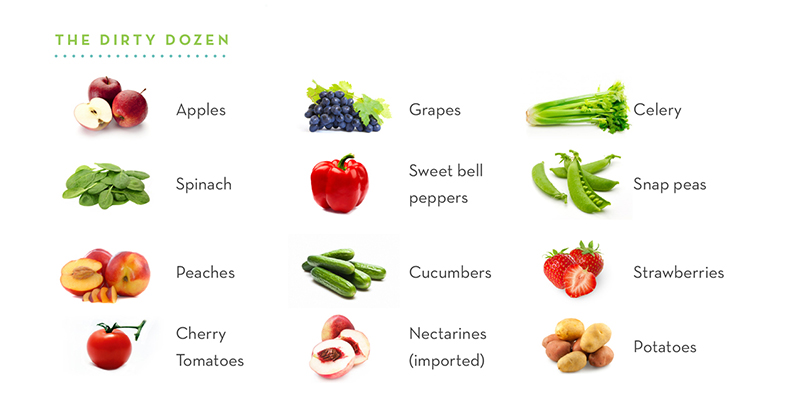 Buying organic is widely considered a better choice for our health and the environment, but it also comes with the organic price tag. When organic produce is two or three times the cost of conventionally-grown produce, purchasing all organic isn’t always economically viable.
Buying organic is widely considered a better choice for our health and the environment, but it also comes with the organic price tag. When organic produce is two or three times the cost of conventionally-grown produce, purchasing all organic isn’t always economically viable.
How do you know when it’s most important to buy organic? The Environmental Working Group (EWG) puts out a handy list each year that identifies 12 fruits and vegetables that contain the highest levels of pesticide contamination, even after washing. These fruits and vegetables are called the “Dirty Dozen,” and the EWG recommends that any produce on this list be bought organic whenever possible. Much of the produce in this category, like berries and leafy greens, have very soft outer layers that pesticides easily permeate.
The EWG also compiles a list of fruits and vegetables with the lowest amounts of pesticide residue, called the “Clean Fifteen.” Produce on this list tends to have firm outer layers or thick skin that protects against pesticide residue, such as avocados and mangoes, so buying conventional is a more economical choice.
You can use the Dirty Dozen and Clean Fifteen guidelines to help you decide what to buy at the grocery store. The EWG’s list is based on the previous year’s harvest, so we’ve included some foods that have appeared on the Dirty Dozen lists in other years as well.
| The Dirty Dozen | The Clean Fifteen | |||
| Apples | Strawberries | Asparagus | Avocados | |
| Grapes | Celery | Cabbage | Cantalope | |
| Peaches | Spinach | Sweet corn | Eggplant | |
| Sweet bell peppers | Nectarines | Grapefruit | Kiwi | |
| Cucumbers | Potatoes | Mangoes | Mushrooms | |
| Cherry tomatoes | Hot peppers | Onions | Papayas | |
| Blueberries | Kale | Pineapple | Sweet peas (frozen) | |
| Collard greens | Sweet potatoes | |||
While the Dirty Dozen and Clean Fifteen are helpful guides for grocery shopping, the EWG emphasizes that the risks of consuming pesticides are far outweighed by the benefits of eating fresh fruits and vegetables. If an organic option for something on the Dirty Dozen list isn’t available, conventionally-grown is still better than no fruit or vegetable at all.







